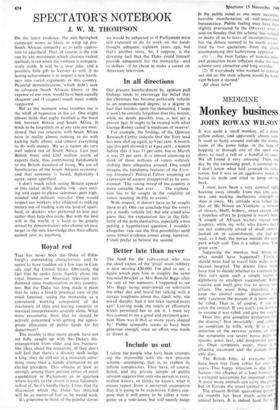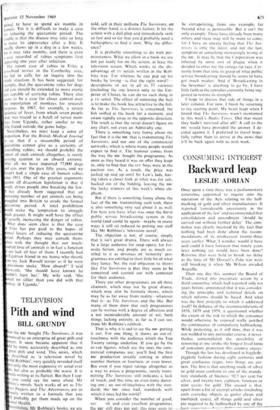MEDICINE
Monkey business
JOHN ROWAN WILSON
It was quite a small monkey, of a pretty yellow colour, and apparently almost tame. It used to hang around outside the dining- room of the game lodge, in the hope of hopping in through one of the open win- dows to steal a roll or a handful of sugar. We all found it very amusing. Then, one day by the swimming pool, it cornered me. I don't know what had aroused its Mita- tation, but it was in an aggressive mood. It bared its teeth and tried to jump on my back.
I must have been a very comical sight, backing away timidly from this tiny crea- ture and making ineffective attempts to shoo it away. My attitude was rather like that of Mr Nixon on Vietnam—a mixture of threats, bluff, bribery, sweet reason, and a hopeless effort to pretend it wasn't there. A couple of African waiters roared with laughter, while my wife, who knows that I am not ordinarily afraid of small animals, looked on in astonishment, she had not read, as I had, the notice outside the game park which said 'This is a rabies area. Take great care.'
Supposing the monkey had bitten me what would have happened? Firstly I should have had to travel fifty miles to the nearest hospital. The doctor there would have had to decide whether to vaccinate me. This isn't quite such a simple matter as diphtheria or smallpox vaccination. Rabies vaccine can itself give rise to severe tote effects. The usual thing, therefore, is io keep the animal under observation, and only vaccinate the patient if it turns out to be rabid. That is, of course, if you C3 catch the animal. If you can't, you just ha to assume it was rabid, and give the vaccine
Does this give complete protection fro
the disease? Not invariably: and rabies no condition to trifle with. It is a ‘i infection of the nervous system, of sshi the symptoms are severe nerve pains a spasms, great fear, and progressive paral sis. Once symptoms occur, there is effective treatment and the patient inv. ably dies.
The British Isles, as everyone knot have been free from rabies for over fif years. This happy situation is due to factors—the absence of a land frontier 2 a stringent quarantine for imported anima A great many animals can carry the disci but in Europe the usual animal is the d The present British quarantine period six months has been much criticised animal lovers. It is indeed hard for a animal to have to spend six months in kennels. Yet it is difficult to make a case for reducing the quarantine period. The trouble is that the disease may take so long to make its appearance after a bite. It usually shows up in a dog in a few weeks, but it may take months, and there is even 3 case recorded of rabies symptoms first appearing one year after infection. The recent case of rabies in Fritz, a cross-bred terrier in the Camberley area, has led to calls for an inquiry into the ,hole situation. It has been suggested, for example, that the quarantine rules for dogs and cats should be extended to more exotic pets capable of carrying rabies. There also seems to be a case for closer control over the importation of monkeys for research purposes. In 1967, for example, a severe epidemic of fever, from which seven people died. was traced to a batch of vervet mon- keys from Uganda, rather similar to my little friend outside the game lodge.
Nevertheless, we must keep a sense of proportion. For the British Medical Journal to say that if a reasonable period of quarantine cannot give us a certainty of controlling rabies, we should prohibit the import of such animals altogether, is surely !Tying caution to an absurd extreme. After all, we have imported 77,000 dogs d cats over the past fifty years. and we aven't had a single case of human rabies nce 1911. One of the greatest arguments gainst all draconian legislation is that it mply drives people into breaking the law. has already been suggested that an ncreasing number of pet animals are being muggled into Britain to evade the formal uarantine period. A total prohibition odd make the temptation to smuggle uch greater. It might well have the effect I actually increasing the danger of rabies. What does seem clear is that the case Fritz has put paid to the hopes of Anal lovers of reducing the quarantine eriod. Perhaps they may console them- yes with the thought that our much- tinted love of animals is in fact a function our lack of fear of them. I recently had Egyptian friend in my house who shrank urn my lack Russell terrier as if he were poisonous snake. 'How absurd!' I said erwards. 'She should have known he ouldn't hurt her.' My wife said, 'She -ed no sillier than you did with that onkey in Uganda.'







































 Previous page
Previous page